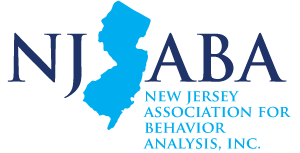MISSION
The NJABA Early Intervention Workgroup is dedicated to promoting the professional practice of applied behavior analysis (ABA) in early intervention and increasing both the private and public capacity through the New Jersey Early Intervention System to provide high-quality behavioral services to all families with young children.
We strive to 1) collaboratively enhance NJEIS administrators’ understanding of ABA services and behavior analysts’ scope of practice and professional obligations and 2) compile resources and literature on high-quality ABA programs for young children with autism.
Leadership Committee
Workgroup Chair Position is currently vacant
2025 Meeting Schedule
Upcoming Meetings
To be announced
Please RSVP to the Workgroup Chair.
Interested, but unsure if you’d like to officially join? Come to a meeting to learn more and network with colleagues. All are welcome! For general inquiries, email info@njaba.org or 609-910-0394.
FAQ
As an ABA therapist in NJEIS, how do I ensure that I am following the state-approved ABA curriculum?
- In 2010, the NJEIS began the process of requiring providers to select, train, and utilize a specific curriculum designed for children with autism spectrum disorder. While an ABA-based curriculum was not required, many agencies took an ABA approach to the curriculum and selected resources such as the VB-MAPP, Rethink, and the Eden Curriculum. Policies regarding implementation and training are thus far agency specific.
- When therapists have been assigned to a child with autism or a child who needs an ABA-based curriculum or approach, they should use the agency-approved curriculum. They should also find out procedures for assessment, collecting and reporting data, and how decisions regarding program changes are made.
- Ideally, each agency should have a supervising BCBA in charge of these cases who strives to ensure that all therapists are using the agency-approved curriculum and procedures.
- Therapists should collaborate with others on the team to make sure that they are following the same curriculum and plan. It is helpful to share materials via a notebook left in the home or a computer-based file-sharing system.
- Any concerns regarding consistent implementation among team members should be discussed with the child’s service coordinator as well as a therapist’s own agency supervisor.
What do I do if there are multiple agencies involved with working with my client?
- If a therapist is working with an agency outside of NJEIS, he/she should obtain parental consent to communicate with other agencies and practitioners using NJEIS form-009 “Parent Consent to Release Early Intervention Records“. The therapist should indicate specific conditions such as permission to email and permission to collaborate on ABA program implementation.”
- Create a note in the Early Intervention Management System (EIMS) that parental consent was obtained. Create a note each time communication is made between agencies. Keep a copy of any text or emails for the child’s file for parents to view as required in the NJ EI System Code of Conduct
- The EI team should make an effort to co-treat with the other agency and/or increase team meetings (BACB Task List 4th edition, item G-06).
- The supervising BCBA who is coordinating the ABA program should determine if the teaching procedures and curriculum used by more than one agency are complementary. If there are conflicts that can’t be resolved, discuss with the family and service coordinator to determine if sharing the case is in the best interest of the child.
- Use common language when EI practitioners and families are not familiar with ABA terminology. (See BACB Task List 4th edition, item G-04) Compose or modify programs so they are conceptually systematic and able to be performed uniformly by all practitioners.
- Communicate with the other agencies to determine which programs are being implemented and which agency is keeping copies of program records and related data. It may be helpful for the agencies to decide which specific areas each will target and coordinate; for example, a provider working through insurance may be coordinating programs for skill acquisition, and the EI agency may be working on generalizing these skills within the home and community. These roles might also be determined by practitioners’ specific areas of expertise so that they are able to provide training and guidance. Some areas for training may include: mand instruction, discrete trial instruction, social skills, feeding, desensitization programs, daily living skills, and maladaptive behavior.
Where can I obtain information about publicly funded early intervention services?
State-funded services for children birth – age 3 are provided by the New Jersey Early Intervention System (NJEIS) in partnership with the Regional Early Intervention Collaboratives (REICs).
As a BCBA in the NJEIS system, how can I adhere to the Professional and Ethical Compliance Code for Behavior Analysts when supervision is not a billable service?
Be able to describe your professional obligations and any challenges and obstacles you encounter.
Inform your supervisor and agency leadership of current ethical code for supervision. Discuss how the agency can support you in maintaining your ethical obligations and how sessions will be scheduled to promote supervision.
Ask your agency to review the Professional and Ethical Compliance Code for Behavior Analysts with all BCBAs, BCaBAs, ABA therapists and members of the interdisciplinary team to ensure understanding of and compliance with all supervision-related responsibilities.
Use a combination of direct supervision, data review, and data collection on parents’ implementation as well as generalization checks to meet the supervision requirements.
Supervisors and supervises should communicate a plan for meeting the supervision guidelines and how they will be tracked for each client.
How can I ensure that I communicate or meet with the other members on the client’s treatment team on an ongoing basis?
Hold Individual Family Service Plans (IFSP) meetings more frequently than the typical review period of every 6 months.
“Co-treats” – having the child’s session with another therapist. Some regions of the NJEIS discourage same-discipline co-treats, and this may need to be addressed with the agency.
Personal communication with team members through the communication log with all therapists, the program book that remains at the home, email, text, online document sharing, etc.
Speak to the service coordinator regarding this concern. Express the need to be consistent in providing effective ABA services and that ABA programs should be delivered consistently between therapists on a team.
Where can I learn more about the effectiveness of ABA for young children and how it’s implemented?
Behavior Analyst Certification Board (2014). Applied Behavior Analysis Treatment of ASD: Practice Guidelines for Healthcare Funders and Managers, 2nd ed. Author: Littleton, CO.
How can I make my session most effective given all of the distractions of typical family life?
Use an evidenced-based parent training model during your sessions to help guide the process and keep the family focused on the goals at hand. This may include using written guides that can be referred to from one session to the next to help focus the parent.
Use principles of applied behavior analysis when interacting with parents and caregivers. Use a task analysis to give caregivers small steps that they can build upon once they have success. Use differential reinforcement and praise for all attempts at carrying over a suggestion and offer feedback and support to make modifications in the future to guide those attempts towards success.
Incorporate behavioral skills training by discussing a skill or strategy, modeling the skill or strategy and then having the caregiver practice the skill or strategy while you observe. Give praise and or feedback in the moment and go back to modeling the skill again if necessary. Continue on in this manner until the caregiver can successfully demonstrate the skill or strategy. Make sure to follow up at your next session as to how the caregiver has been doing when you were not there. Ask them to demonstrate the skill or strategy for you again so that you can ensure successful implementation and offer ways to then build upon that skill.
Take a step back and look at the big picture, what is most important for this family and how can you make an impact in that area. If a family feels successful in even the smallest of ways, they will be more likely to follow your future suggestions.
How can I involve the parents in the client’s ABA sessions?
The NJEIS is a family training model and parent training should therefore be incorporated into all services.
- Focus on goals that are meaningful to the family and can be incorporated into routines outside of sessions.
- Provide the family with direct instruction regarding how to implement research-based strategies with their children.
- Incorporate parents as an active participant in sessions while providing coaching and feedback.
- Shape parents’ behavior by initially selecting strategies and goals that are easily attainable and easy to implement. This way the parent can access reinforcement through success.
- Speak to the service coordinator about including family training as a billable service. This will allow the therapist to work with the parent outside of direct instruction with the child. The therapist will then be able to spend more time familiarizing the family with behavioral principles and providing opportunities for discussion and behavioral skill acquisition.
- See resources regarding behavioral skills training and parent training protocols such as Optimistic Parenting: Hope and Help for You and Your Challenging Child
How can I make my session most effective given all of the distractions of typical family life?
Use an evidenced-based parent training model during your sessions to help guide the process and keep the family focused on the goals at hand. This may include using written guides that can be referred to from one session to the next to help focus the parent.
Use principles of applied behavior analysis when interacting with parents and caregivers. Use a task analysis to give caregivers small steps that they can build upon once they have success. Use differential reinforcement and praise for all attempts at carrying over a suggestion and offer feedback and support to make modifications in the future to guide those attempts towards success.
Incorporate behavioral skills training by discussing a skill or strategy, modeling the skill or strategy and then having the caregiver practice the skill or strategy while you observe. Give praise and or feedback in the moment and go back to modeling the skill again if necessary. Continue on in this manner until the caregiver can successfully demonstrate the skill or strategy. Make sure to follow up at your next session as to how the caregiver has been doing when you were not there. Ask them to demonstrate the skill or strategy for you again so that you can ensure successful implementation and offer ways to then build upon that skill.
Take a step back and look at the big picture, what is most important for this family and how can you make an impact in that area. If a family feels successful in even the smallest of ways, they will be more likely to follow your future suggestions.

